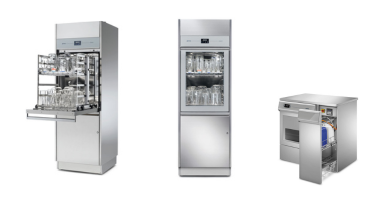The cleanliness of laboratory glassware plays a crucial role in conducting experiments. Residues of chemicals, contaminants, or biological materials left on glassware (such as laboratory flasks, test tubes, and laboratory pipettes) can affect the accuracy of results. Traditional hand washing methods, even if carried out carefully, cannot guarantee a quality result and are also time-consuming. Automating the cleaning process using modern laboratory washers allows laboratories to operate efficiently and safely, and to ensure the accuracy and reliability of experimental results.
The Evolution of Laboratory Glassware Washers
Gone are the days when lab technicians spent hours scrubbing and rinsing glassware. Modern laboratory glassware washing machines have evolved to provide efficient, consistent, and thorough cleaning, saving time and reducing the risk of contamination. These machines are designed to handle the delicate nature of laboratory glassware while ensuring that every piece is cleaned to the highest standards.
Features of Modern Laboratory Glassware Washers
- Automated Cleaning Cycles: These washers come with programmable settings that allow you to choose the appropriate cycle based on the type of glassware and the level of contamination. This ensures that each piece is cleaned thoroughly without damage.
- High-Temperature Wash and Rinse: High temperatures are crucial for sterilising glassware, killing any remaining bacteria or spores. Many glassware washers offer cycles that reach temperatures sufficient to achieve this level of sterilisation.
- Customisable Racks and Holders: Laboratory glassware comes in various shapes and sizes. Modern washers offer customisable racks and holders to securely fit different types of glassware, preventing breakage during the wash cycle.
- Eco-Friendly Options: As sustainability becomes increasingly important, many glassware washers now feature eco-friendly options that use less water and energy without compromising on cleaning efficacy.
- Built-In Drying Systems: To further streamline the cleaning process, many washers include built-in drying systems that ensure glassware is ready for immediate use post-wash, eliminating the need for manual drying.
- Detergents: It is important to use the right detergents to thoroughly clean your instruments. Depending on the type and contamination of the instruments to be washed, alkaline and enzymatic detergents can be used, as well as acid neutralizers (for the neutralization stage).
Benefits of Using Laboratory Glassware Washing Machines
- Time Efficiency: Automated glassware washers free up valuable time for lab technicians, allowing them to focus on more critical tasks.
- Consistency: With programmed cycles, the cleaning process is standardised, ensuring that all glassware is cleaned uniformly.
- Safety: Reduces the risk of injury associated with hand washing delicate glassware.
- Reduced Contamination: Automated systems minimize the risk of cross-contamination, crucial for maintaining the integrity of experimental results.
Choosing the Right Glassware Washer for Laboratory
When selecting a glassware washer for your laboratory, consider the following:
- Capacity: Ensure the washer can handle the volume of glassware your lab uses daily. Upon your needs, you can choose Underbench glasswashers or Glassware washers of high capacity.
- Compatibility: Check if the washer can accommodate the specific types of glassware you use.
- Maintenance: Opt for a model that is easy to maintain and service, ensuring long-term reliability.
- Cost: While upfront costs are important, consider the long-term savings in time and labor.
Laboratory glassware washers have revolutionised the way we maintain hygiene in scientific settings. By automating the cleaning process, these machines not only enhance the efficiency and safety of laboratories but also ensure the accuracy and reliability of experimental results. Investing in a high-quality laboratory glassware washer is a step towards elevating your lab's operational standards and ensuring the success of your research endeavours.

